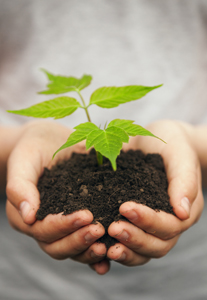April 28th, 2021

It’s common for children to suck their thumb at a young age. Dr. Jennifer Wells and Dr. Erik Wells and our team want you to understand the potential issues that can surface down the road if the habit isn’t broken early on.
It’s normal for infants to explore the function of their mouths by putting objects like their thumbs inside it. You shouldn’t be concerned if your baby regularly sucks his or her thumb. For infants who are still growing their baby teeth, thumb sucking can help with stimulating growth and development of their baby teeth.
Thumb sucking is not a problem among infants because they generally do it to sooth and comfort themselves. Problems can occur of kids continue the habit when their baby teeth begin to fall out, around six years of age.
If you have a young child whose adult teeth are starting to come in, that’s when thumb sucking can start to be a problem. Most children stop thumb sucking between the ages of two and three years. According to the American Dental Association, if thumb sucking continues as adult teeth come in, this can lead to problems involving improper alignment of teeth and growth of the jaw, gums, and roof of the mouth.
It may also affect your child’s speech after that, by causing a lisp or other speech impediments. As a parent, you may need to begin to regulate and intervene if thumb sucking starts to become a bigger problem for your child.
How to Stop Thumb Sucking
- Provide comfort to your child if thumb sucking happens when he or she is anxious.
- Limit thumb sucking initially to bedtime or naptime.
- Employ positive reinforcement for good behavior.
- Talk with your child about the potential problems that come from this habit.
- Distract your son or daughter with activities such as fun games any time you notice it starting.
- Involve your little one in choosing methods for stopping, like positive rewards.
- Have Dr. Jennifer Wells and Dr. Erik Wells talk to your child to reinforce concerns about thumb sucking.
Don’t forget that thumb sucking is a common habit that many children indulge in, and it should not be a concern right away. If you’re worried about your child’s thumb-sucking habit, start to address the issue as soon as possible.
The above techniques can help to reduce the amount of time your child sucks a thumb. Dr. Jennifer Wells and Dr. Erik Wells and our team are here to help you if you have any questions or concerns about this habit.
Feel free to call our Watkinsville office and we will be happy to help you and your child.
April 21st, 2021

The idea for Earth Day was the brainchild of Gaylord Nelson, a senator from Wisconsin. He envisioned an Earth Day that would be a kind of environmental teach-in. The first Earth Day celebration took place on April 22, 1970, and a surprising 20 million people participated on that day. Ultimately, it became the largest organized celebration in US history.
Earth Day Over the Years
Over the years, the recognition of the day, and the number of people celebrating it all over the world, turned Earth Day into an international celebration. Because it is celebrated throughout the world, it is not only the largest international environmental observation, but it is also more widely celebrated than any other environmental event in the world. Today, Earth Day is celebrated in 175 countries where over 500 million people participate in celebrations.
The Earth Day Movement
The Earth Day movement is credited with developing the idea that people should “think green”. It encouraged congress to enact laws, including one that resulted in the creation of the Environmental Protection Agency. It also inspired the passage of the Endangered Species Act.
The Five R's and Their Importance
- Reduce – Reduce by avoiding unnecessary purchases. Reduce your use of materials that wind up in landfills. Reduce the use of chemicals around your house. Reduce your use of disposable bags, plates, cups, eating utensils, and batteries.
- Reuse – Instead of using plastic bags for your groceries or purchases, bring your own reusable bags. When you go to buy coffee at Starbucks, take a travel mug so you don't have to get your coffee in a disposable paper cup. Instead of storing food in disposable refrigerator containers, buy containers that can be washed and reused. Don't use regular batteries. Whenever possible, opt for rechargeable batteries that you can reuse.
- Recycle – Most cities offer a recycling program to collect used bottles, cans, and newspapers. Recycling includes collecting recyclable materials that would otherwise be considered waste, sorting and processing recyclables into raw materials such as fibers and manufacturing raw materials into new products.
- Re-buy – Make an effort to purchase things that are made through recycling. When purchasing furniture, look for items that are made from reclaimed wood. When buying paper for kids school work, computer printer paper, holiday cards, or anything else, make a point of purchasing recycled paper products. Instead of buying clothing at full retail price, shop for second hand clothing. You will save a lot of money by doing so!
- Rethink – Rethink the way you do things so that you do them in an eco-conscious way at all times. Instead of driving to work alone, consider taking the bus or going in a carpool. Walk or ride your bike when you're only going a short distance. Plan your shopping trips and errand runs so that you can do everything on one day, and do it in a way where you can save time and gas.
Other ways to "think green" include growing your own food, composting yard waste and food scraps, or by participating in local recycling programs. Join a group like Freecycle so you can share your unneeded and unwanted possessions with people who can use them. Likewise, you'll be able to get things you need or want for free.
Earth Day teaches people that the planet belongs to everyone, so everyone is equally responsible for protecting it. Although Earth Day is an environmental celebration, our team at Healthy Smiles wants to remind you that you don't have to wait until then to make changes that will allow you and your family to live a greener life.
Happy Earth Day from the team at Healthy Smiles.
April 7th, 2021

The Importance of Facial Protection
Americans from all walks of life should mark April as National Facial Protection Month on their calendars. The American Association of Pediatric Dentistry, Academy for Sports Dentistry, American Academy of Pediatric Dentistry, and American Association of Oral and Maxillofacial Surgeons have combined forces to sponsor this annual campaign, which aims to educate and remind us of the importance of protecting our face and teeth against impacts and injuries.
Wearing a helmet can save your life and prevent devastating physical damage in a variety of situations, from playing football to riding a bicycle. According to the American Association of Oral and Maxillofacial Surgeons, helmets reduce the risk of various head injuries by as much as 85 percent. Whether helmet laws apply in your area or not, Dr. Jennifer Wells and Dr. Erik Wells and our team at Healthy Smiles want you to make sure you and your loved ones wear helmets with the appropriate safety ratings for specific activities. (A sticker on or inside the helmet will usually indicate this rating.) Helmets can also help save your teeth if they come with an attached faceguard, an essential addition for football players and others involved in contact sports.
Preventing Dental Injuries
A mouthguard can protect you against a variety of dental injuries, such as cracked, broken, or knocked-out teeth. The American Dental Association states that mouthguards play an essential role in preventing up to 200,000 dental injuries each year, and many states mandate their use for sports activities such as football and hockey. The Academy for Sports Dentistry warns, however, that these mouthguards must be custom-fitted as precisely as possible to prove effective. Have a professional-quality mouthguard molded and fitted by our team at Healthy Smiles for better protection than a generic store-bought or “boil-and-bite” variety can offer. These cheaper versions tend to wear out quickly, interfere with proper breathing, and provide uneven degrees of cushion against impacts. Always have a fresh mouthguard fitted for each new sports season.
Choose the right combination of helmet, faceguard, and mouthguard to protect your teeth and face this April, and tell your friends to do the same! To learn more about mouthguards, or to schedule an appointment with Dr. Jennifer Wells and Dr. Erik Wells, please give us a call at our convenient Watkinsville office!
March 31st, 2021

Dr. Jennifer Wells and Dr. Erik Wells and our team know that cavities know no age boundaries, and that is why we recommend a visit to our Watkinsville office by a child’s first birthday. That also happens to be the opinion of our friends at the American Academy of Pediatrics, as well as the American Dental Association.
Research has shown that more than one in four kids has had at least one cavity by the time they’re four years old. In fact, many children get cavities as early as age two, which is a critical reason why you should pay us a visit sooner rather than later. Your child’s appointment at Healthy Smiles also covers topics such as the importance of baby teeth, nutrition, development, and any concerns you may have with your child’s dental health. We believe that your child’s first visit with Dr. Jennifer Wells and Dr. Erik Wells should be an enjoyable and positive one, and we strive to teach good oral care that will enable your child to have a beautiful smile that lasts a lifetime.
To learn more about baby teeth, or to schedule your child’s next visit with Dr. Jennifer Wells and Dr. Erik Wells, please give us a call today! We look forward to seeing you!




